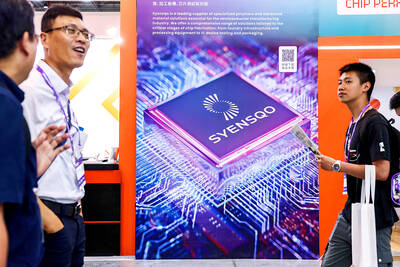China plans to launch its own online encyclopedia next year, hoping to build a “cultural Great Wall” that can rival Wikipedia as a go-to information source for Chinese Internet users, whom Beijing fears are being corrupted by foreign influences.
China is under pressure to write its own encyclopedia so it can guide public thought, according to a statement by the project’s executive editor Yang Muzhi (楊牧之) published last month on the Chinese Academy of Sciences’ Web site.
He once listed Wikipedia, which is available in China and Britain’s Encyclopedia Britannica as potential rivals and said the project aims to exceed them, according to an article he wrote late last year.
The project, which would be under the guidance of state-owned China Publishing Group Corp (中國出版集團), “must have Chinese characteristics,” he wrote, adding it would be a “symbol of the country’s cultural and technological development” and increase its soft power and international influence.
Unlike Wikipedia — and its Chinese version Baidu Baike (百度百科) — which are written by volunteers and are in a constant state of revision, the new project, which was approved in 2011, is to be entirely written by professionals.
So far more than 20,000 academics have been enlisted to compile the project, which aims to have more than 300,000 entries by its launch next year .
The new encyclopedia is to be based on a previous printed version, published in book form in 1993. A second edition, which can be accessed through a special terminal, was released in 2009.
The newest version is to be released online before being published in a bound edition.
China has more 700 million Internet users, but a 2015 report by US think tank Freedom House found that the country had the most restrictive online use policies of 65 nations it studied, ranking below Iran and Syria.
It has maintained that its various forms of Internet censorship — collectively known as the “Great Firewall” — are necessary for protecting its national security.
Beijing has issued a new restriction for online freedoms, requiring Chinese Internet users to provide their real names when accessing online news sources.
The new restriction is to come into effect on June 1.

SEMICONDUCTOR SERVICES: A company executive said that Taiwanese firms must think about how to participate in global supply chains and lift their competitiveness Taiwan Semiconductor Manufacturing Co (TSMC, 台積電) yesterday said it expects to launch its first multifunctional service center in Pingtung County in the middle of 2027, in a bid to foster a resilient high-tech facility construction ecosystem. TSMC broached the idea of creating a center two or three years ago when it started building new manufacturing capacity in the US and Japan, the company said. The center, dubbed an “ecosystem park,” would assist local manufacturing facility construction partners to upgrade their capabilities and secure more deals from other global chipmakers such as Intel Corp, Micron Technology Inc and Infineon Technologies AG, TSMC said. It

People walk past advertising for a Syensqo chip at the Semicon Taiwan exhibition in Taipei yesterday.

NO BREAKTHROUGH? More substantial ‘deliverables,’ such as tariff reductions, would likely be saved for a meeting between Trump and Xi later this year, a trade expert said China launched two probes targeting the US semiconductor sector on Saturday ahead of talks between the two nations in Spain this week on trade, national security and the ownership of social media platform TikTok. China’s Ministry of Commerce announced an anti-dumping investigation into certain analog integrated circuits (ICs) imported from the US. The investigation is to target some commodity interface ICs and gate driver ICs, which are commonly made by US companies such as Texas Instruments Inc and ON Semiconductor Corp. The ministry also announced an anti-discrimination probe into US measures against China’s chip sector. US measures such as export curbs and tariffs

The US on Friday penalized two Chinese firms that acquired US chipmaking equipment for China’s top chipmaker, Semiconductor Manufacturing International Corp (SMIC, 中芯國際), including them among 32 entities that were added to the US Department of Commerce’s restricted trade list, a US government posting showed. Twenty-three of the 32 are in China. GMC Semiconductor Technology (Wuxi) Co (吉姆西半導體科技) and Jicun Semiconductor Technology (Shanghai) Co (吉存半導體科技) were placed on the list, formally known as the Entity List, for acquiring equipment for SMIC Northern Integrated Circuit Manufacturing (Beijing) Corp (中芯北方積體電路) and Semiconductor Manufacturing International (Beijing) Corp (中芯北京), the US Federal Register posting said. The